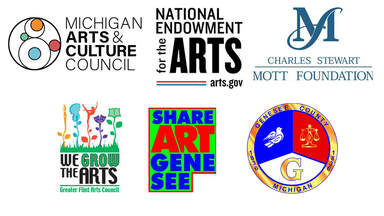June 24 - July 23, 2022
Monsterbet: An Aberrant Abecedarius - Heidi Brueckner
Black & White - Craig Hinshaw
Midwest Moonfog Part 2 - Michael Weigman
*Live* Artist Talk with Craig Hinshaw to be held Friday, June 24 at 5:30PM with Opening Reception to follow.
ARTWALK Friday, July 8 from 6 - 9 PM.
Buckham Gallery is pleased to present three concurrent solo exhibitions featuring Heidi Brueckner, Craig Hinshaw and Michael Weigman.
Monsterbet: An Aberrant Abecedarius | Heidi Brueckner
Through the personification of the precarious, dark, and grotesque aspects of human beings, Heidi Brueckner creates mixed media paintings in a format that reflects children’s alphabet books. This series, Monsterbet: An Aberrant Abecedarius relishes in the fine line between fanciful and fearful. Each letter of the alphabet is coupled with an imaginary monster with a particular quirk that offers insight into their personal story. Within these works, Brueckner uses collage to explore bright color and pattern, tilted and flattened space, and distorted form to achieve psychological expression while still being humorous and fun.
Black & White | Craig Hinshaw
From black clay to porcelain, Black & White returns to Craig Hinshaw’s 1971 roots at Ball State University. Within these works, Hinshaw shows animated gestural figures with fully functional works, created on the wheel. His works take on a life of their own.
Midwest Moonfog Part 2 | Michael Weigman
Inspired by suburban upbringing, underground subcultures, and industrial era history, Michael Weigman creates mixed media illustrations while employing printmaking processes to honor its legacy as a communicative medium for the working class. Within this series, Midwest Moonfog Part 2, there is a focus on our society appearing to be on the precipice of great change that includes evolution in areas, but also lingering entrenchment. Everywhere the crumbling remnants of the industrial age lurk within our communities, through this, Weigman strives to shed light on societal issues, to tear off the blindfolds our fear has created before history repeats itself again.
ARTWALK Friday, July 8 from 6 - 9 PM.
Buckham Gallery is pleased to present three concurrent solo exhibitions featuring Heidi Brueckner, Craig Hinshaw and Michael Weigman.
Monsterbet: An Aberrant Abecedarius | Heidi Brueckner
Through the personification of the precarious, dark, and grotesque aspects of human beings, Heidi Brueckner creates mixed media paintings in a format that reflects children’s alphabet books. This series, Monsterbet: An Aberrant Abecedarius relishes in the fine line between fanciful and fearful. Each letter of the alphabet is coupled with an imaginary monster with a particular quirk that offers insight into their personal story. Within these works, Brueckner uses collage to explore bright color and pattern, tilted and flattened space, and distorted form to achieve psychological expression while still being humorous and fun.
Black & White | Craig Hinshaw
From black clay to porcelain, Black & White returns to Craig Hinshaw’s 1971 roots at Ball State University. Within these works, Hinshaw shows animated gestural figures with fully functional works, created on the wheel. His works take on a life of their own.
Midwest Moonfog Part 2 | Michael Weigman
Inspired by suburban upbringing, underground subcultures, and industrial era history, Michael Weigman creates mixed media illustrations while employing printmaking processes to honor its legacy as a communicative medium for the working class. Within this series, Midwest Moonfog Part 2, there is a focus on our society appearing to be on the precipice of great change that includes evolution in areas, but also lingering entrenchment. Everywhere the crumbling remnants of the industrial age lurk within our communities, through this, Weigman strives to shed light on societal issues, to tear off the blindfolds our fear has created before history repeats itself again.


